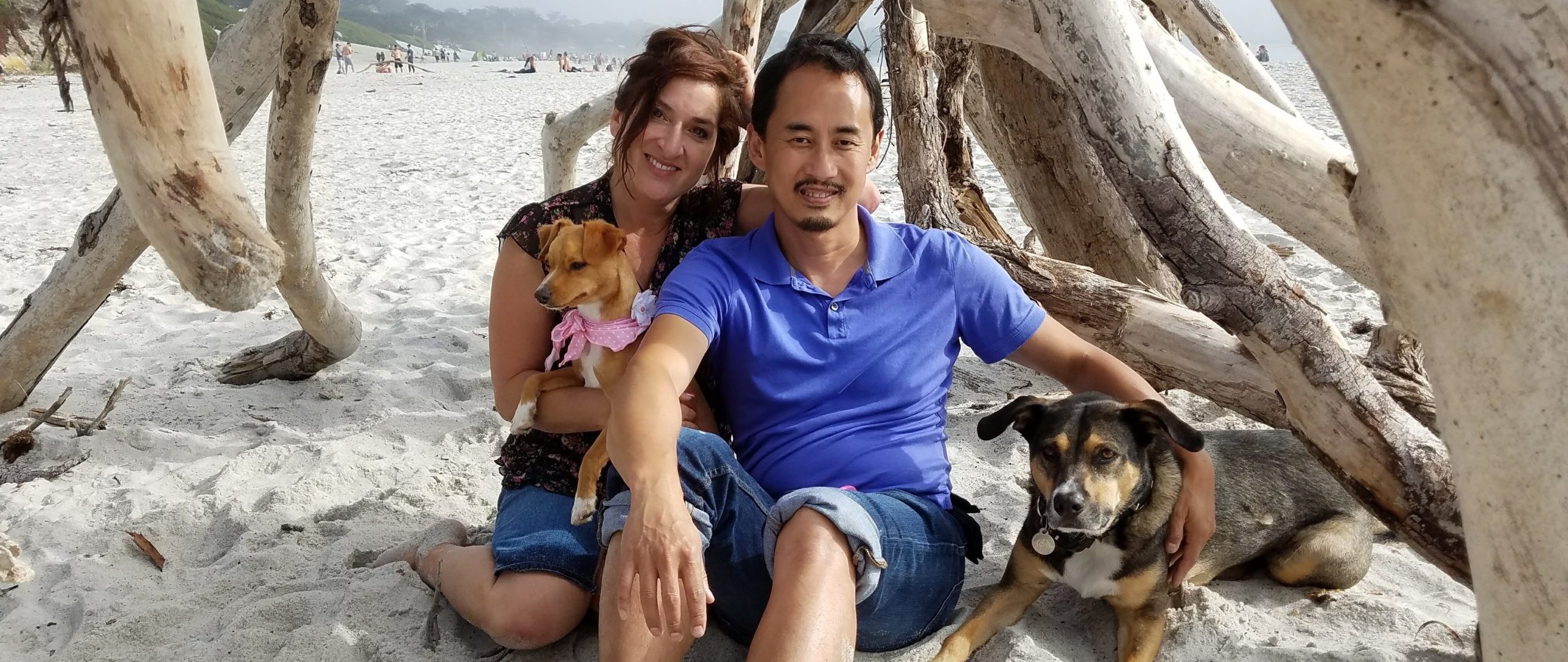By Daniel A. Saez, MSc, Treatment and Trials Navigator, GO2 for Lung Cancer

Rebecca (KRAS driven stage 4 NSCLC patient) and Wayne Yeung (caregiver)
Since the original publication of this article, the United States Food and Drug Administration (FDA) approved Lumakras (sotorasib) for the first line treatment of advanced non-small cell lung cancer (NSCLC) with tumors having the G12C change in KRAS. Learn more.
The Link Between KRAS and Non-Small Cell Lung Cancer
Many patients diagnosed with non-small cell lung cancer (NSCLC) will also have a mutation for their cancer. These mutations have unintended consequences that can spur a cancer’s growth and development. The KRAS mutation is found in 20-25% of NSCLC patients, making it the most common mutation in NSCLC.
New Shifts in the Treatment Landscape
For many years, being KRAS positive was only associated with poor outcomes, with little to no options for treatment outside of traditional chemotherapy. But hope is now on the horizon.
While there are currently no FDA approved targeted therapies for KRAS (leaving chemotherapy, immunotherapy, and radiation as the main treatment options), there is a lot of exciting research happening—and your options may soon change. Researchers have found success in identifying drugs for one specific type of KRAS mutation, called G12C, which can be found in approximately 13% of NSCLC adenocarcinomas. Most notably, two drugs–sotorasib and adagrasib–are in clinical trials showing promising results with manageable side effects. One of the two drugs, sotorasib, was granted breakthrough designation by the FDA in 2020, highlighting how far we’ve come in the KRAS world.
These two promising drugs, however, are only effective for G12C. This means that it is very important that patients diagnosed with stage IV (4) NSCLC receive comprehensive biomarker testing regardless of whether or not they have a smoking history. Other types of KRAS mutations that might be identified through this comprehensive biomarker testing include G12D and G12V. We are also beginning to see some clinical trials studying new drugs targeting other KRAS mutations.
Clinical Trials: Hope on the Horizon
Patients who have KRAS-driven NSCLC with something other than G12C may be able to rely on a wide variety of available clinical trials ranging from combinations of other inhibitors to immunotherapy and vaccine trials. Many pharmaceutical companies are also attempting to develop drugs specific for KRAS mutations other than G12C.
While further study is required, it is becoming increasingly important for physicians to look at a patient’s mutational status when prescribing treatments. Recent evaluation of the results of sotorasib and adagrasib clinical trials suggest that the effectiveness of these drugs may be affected by other existing mutations within the cancer cells. Additionally, some common co-mutations with KRAS affect how well existing FDA-approved immunotherapies work.
Clinical Trials: A Care Option Worth Exploring
While some patients and caregivers believe that clinical trials are a last-ditch effort reserved for patients who have tried everything else already, this is not the case.
GO2 for Lung Cancer reached out to Rebecca, a patient with KRAS driven stage 4 NSCLC and her caregiver, Wayne, for their experience using clinical trials as an early treatment option:
“We think it was very important to have clinical trials available as a treatment option early in Rebecca’s stage 4 diagnosis. When she participated in her trial, she was healthy. We went into it with a lot of hope and optimism. She couldn’t continue because the side effects were devastating and the cancer progressed. We believe her good health allowed her to bounce back from serious complications without lasting effects. We think cancer survivors can benefit from having a trial that potentially can extend their lives for a long time.”
If you are interested in discussing possible clinical trials, consider contacting our LungMATCH navigators for personalized searches and help.

Hi Daniel,
Is KRAS the most common mutation in lung cancer or is it p53? Should we go back to thinking about p53 again?
Hi Murry,
p53 specific mutations certainly do occur in a high percentage of NSCLC adenocarcinomas. As the author, I should have been more specific in my terminology and I apologize. KRAS is the most prevalent NSCLC adenocarcinoma targetable mutation. There are clinical trials for p53 specific mutations so there is still focus placed on this mutation. However, for most patients that have p53 mutations as a co-mutation to another oncogenic mutation, the p53 is usually not primarily targeted. If you have a specific question for you or a loved one’s situation, please reach out to our LungMATCH specialists through our Helpline: https://go2.org/resources-and-support/general-support/helpline/
Daniel A. Saez, MSc, Treatment and Trials Navigator